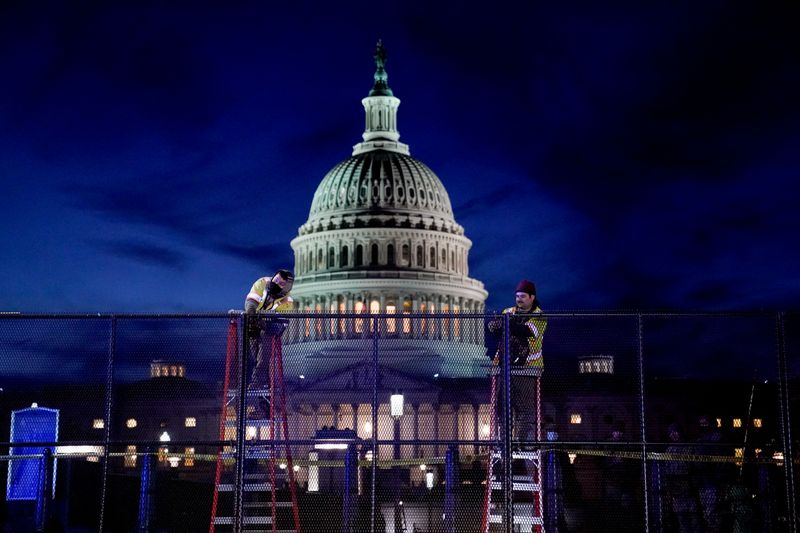By David Morgan, Susan Cornwell and Joseph Ax
WASHINGTON (Reuters) - Democrats in the House of Representatives plan to introduce misconduct charges on Monday that could lead to a second impeachment of President Donald Trump, two sources familiar with the matter said, after a violent crowd of Trump supporters stormed the U.S. Capitol in an assault on American democracy.
With a majority in the House, Democrats appear poised for a historic first: No president has ever been impeached twice.
But it is unclear whether lawmakers would be able to remove Trump from office, as any impeachment would prompt a trial in the Senate, where his fellow Republicans hold sway.
Top Democrats have called on Vice President Mike Pence and Trump's Cabinet to invoke the U.S. Constitution's 25th Amendment, which allows them to remove the president if he is unable to discharge his official duties. Pence is opposed to the idea, an adviser said.
Democrats, who said a House vote on impeachment could come next week, hope the threat could intensify pressure on Pence and the Cabinet to act to remove Trump before his term ends in less than two weeks.
The sources said the articles of impeachment, which are formal charges of misconduct, were crafted by Democratic Representatives David Cicilline, Ted Lieu and Jamie Raskin.
A copy of the measure circulating among members of Congress charges Trump with "inciting violence against the government of the United States" in a bid to overturn his loss to President-elect Joe Biden in the 2020 presidential election.
The articles also cite Trump's hour-long phone call last week with Georgia Secretary of State Brad Raffensperger, in which Trump asked the official to "find" enough votes to overturn Biden's victory in that state.
PELOSI SAYS TRUMP 'UNHINGED'
House Speaker Nancy Pelosi called Trump "unhinged" on Friday and said Congress must do everything possible to protect Americans, even though Trump's term in office will end on Jan. 20 when Biden is sworn in.
She also said she had spoken with the nation's top general, Joint Chiefs of Staff Chairman Mark Milley, about preventing Trump from initiating military hostilities or launching a nuclear weapon.
The extraordinary developments came two days after Trump exhorted thousands of followers to march to the Capitol, prompting a chaotic scene in which crowds breached the building, forced the evacuation of both chambers and left a police officer and four others dead in their wake.
At least one Senate Republican, Ben Sasse of Nebraska, said he would consider supporting an impeachment proceeding.
Sasse, a frequent Trump critic, told CBS News on Friday he would "definitely consider" any articles of impeachment because the president "disregarded his oath of office."
Trump allies, including Senator Lindsey Graham (NYSE:GHM) and the House Republican leader, Kevin McCarthy, had urged Democrats to shelve talk of impeachment to avoid further division.
"If Speaker Pelosi pushes impeachment in the last days of the Trump presidency it will do more harm than good," Graham said on Twitter.
If the House impeaches Trump, the decision on whether to remove him would fall to the Republican-controlled Senate, which has already acquitted him once before. With Trump's term ending a day after the Senate is scheduled to return from recess on Jan. 19, the chances of an actual ouster appear slim.
Removing a U.S. president requires a two-thirds majority in the Senate. Republican Senate Majority Leader Mitch McConnell has not commented on a possible impeachment.
Biden told reporters on Friday that he viewed Trump as "unfit" for office but said he would let Congress decide for itself what to do.
Pelosi told members on a Democratic conference call that she would speak to Biden on Friday afternoon, according to a source who was listening to the call.
She also said she had gotten assurances from Milley that there are safeguards in place for the use of nuclear weapons, the source said.
Milley's office said Pelosi had reached out to him and that the general "answered her questions regarding the process of nuclear command authority."
Neither the military nor Congress can overrule a president's orders to launch nuclear weapons if the order is legal, according to the non-partisan Congressional Research Service.
REPUBLICAN RIFT
Under mounting pressure, an uncharacteristically subdued Trump finally denounced the violence in a video on Thursday evening in which he also promised to ensure a smooth transition to Biden's administration.
By Friday morning, however, a more familiar and pugilistic tone had returned. On Twitter, he praised his supporters and said, "They will not be disrespected or treated unfairly in any way, shape or form!!!"
The FBI and prosecutors are investigating and criminally charging people who took part in violence at the Capitol.
Trump also confirmed he would not attend Biden's inauguration, departing from a time-honored tradition that typically sees the outgoing president escort his successor to the ceremony. The practice is seen as an important part of the peaceful transfer of power.
Trump's role in encouraging Wednesday's chaos has opened a growing rift within the Republican Party. A handful of Republicans, including Maryland Governor Larry Hogan, Massachusetts Governor Charlie Baker and U.S. Representative Adam Kinzinger, have said Trump should leave office immediately.
Numerous senior Trump administration officials have resigned in protest over the invasion of the Capitol, including two Cabinet members: Elaine Chao, the transportation secretary and McConnell's wife, and Betsy DeVos, the education secretary.
Congress certified Biden's election victory early on Thursday, after authorities cleared the Capitol. Even after the violence, more than half of House Republicans and eight Republican senators voted to sustain objections to some states' results, backing Trump.
In addition to considering impeachment, dozens of House Democrats have asked their party leadership to pursue measures that would censure members who incite violence and establish a select committee on violent domestic terrorism.
The House impeached Trump in December 2019 for pressuring the Ukrainian president to investigate Biden, but the Senate acquitted him in February 2020.

Democrats are set to take narrow control of the Senate after winning two runoff elections in Georgia on Tuesday. The new senators will not be sworn in until the state certifies its results later this month.
